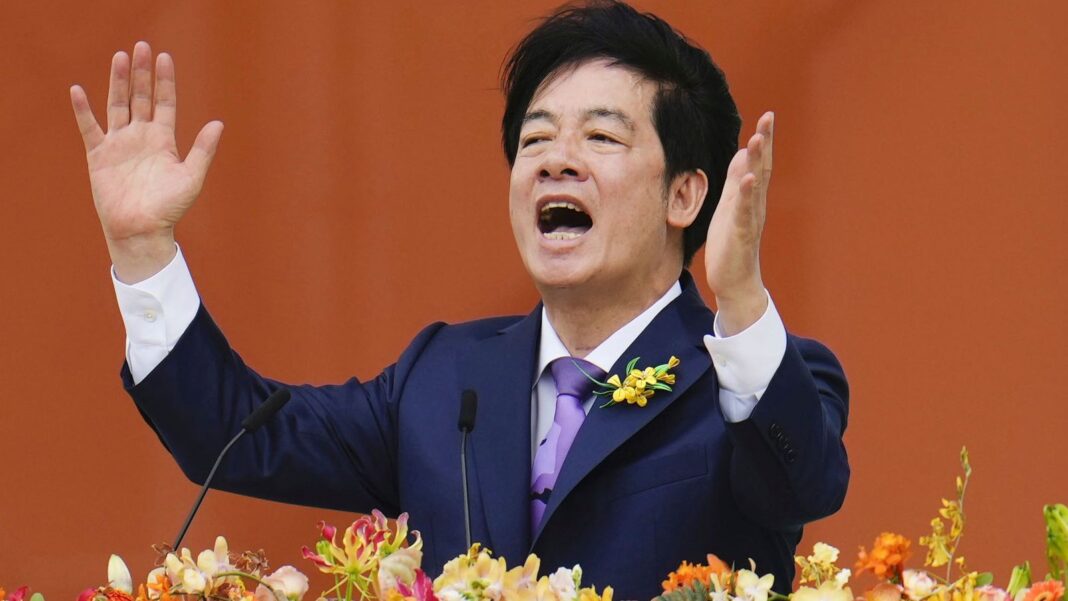The inauguration of Taiwan’s new president, Lai Ching-te, is more about handing over the baton than any dramatic change in policy for the island which is overshadowed by its large and powerful neighbour, China.
It’s expected Lai Ching-te (also called by his English name, William Lai) will stay the course set by his predecessor, Tsai Ing-wen.
But his first speech as the new president was closely watched in Asia for any clues about how Taiwan will handle its difficult relationship with China.
In a careful and considered address, Mr Lai urged China to “stop threatening Taiwan” and called for “peace and stability” in the Taiwan Strait.
China’s position is unequivocal – that Taiwan is part of China and “re-unification” with the mainland is inevitable.
Many on the island want to maintain its sovereignty and democracy. But the pressure is building and Taiwan knows it.
“So long as China refuses to renounce the use of force against Taiwan, all of us in Taiwan ought to understand, that even if we accept the entirety of China’s position and give up our sovereignty, China’s ambition to annex Taiwan will not simply disappear,” Mr Lai said.
Mr Lai and his wife Wu Mei-ju wave to the crowds. Pic: Reuters
In Beijing today, the response was firm. Taiwan Affairs Office spokesman Chen Binhua said: “The mainland and Taiwan belong to the same China, and Taiwan is an inalienable part of China.
“Taiwan independence is incompatible with peace in the Taiwan Strait.
“Our will to resolve the Taiwan question and complete national reunification is rock-solid, our ability to safeguard national sovereignty and territorial integrity is impregnable, and our actions against ‘Taiwan independence’ and foreign interference are resolute and strong.
“We will never tolerate or condone any form of secessionist acts of ‘Taiwan independence’.”

Pic: Reuters
The inauguration celebration was big on colour and big on mentioning “democracy” – Mr Lai dropped it in more than 30 times.
This was his first chance as president to promote Taiwan’s democratic and sovereign status.
Still, it was clear this was a speech designed to neither appease nor antagonise the Chinese Communist Party.
And that is exactly the difficult balancing act the Taiwanese government is faced with.
Over the last few years, Taiwan has welcomed hundreds of journalists, politicians and diplomats to the island.
The most controversial was the visit by former US House Speaker Nancy Pelosi in 2022. It caused a crisis.
Chinese missiles, ships and planes buzzed around the island for days after the trip.

Dancers perform during a colourful inauguration ceremony in Taipei. Pic: AP

Pic: AP

Pic: AP
Unofficial US delegation attends ceremony
The US does not have formal diplomatic ties with Taiwan, but does acknowledge a “robust unofficial relationship”.
It knows well that any high-profile visits to the island would be fiercely condemned by China.
Only an unofficial US delegation was present at the ceremony today.
These days China has a two-pronged strategy towards Taiwan. The tough approach and the softer approach – something akin to trying to win over a few hearts and minds on the way.
The tough one sees Chinese naval vessels and fighter jets operating ever closer to Taiwan, including its mountainous eastern side.
Read more on Sky News:
Why US is imposing 100% tariff on Chinese electric cars
Iran’s president and foreign minister dead – latest updates

Pic: AP

Pic: DPA/AP

Mr Lai’s address to the crowds was careful and considered. Pic: Reuters
Diplomatically, China has been gradually peeling away the handful of tiny island countries and micro-states in the Pacific and Caribbean who recognise Taiwan, enticing them with trade and investment to switch sides.
But on the other side, China is encouraging Taiwanese investment, making it easier for them to buy property, study and work on the mainland.

Keep up with all the latest news from the UK and around the world by following Sky News
Mr Lai will aim to maintain the status quo when it comes to China.
In the past, China has called him a “separatist” and “dangerous”.
He’s since modified his position urging “sovereignty” and saying nothing about independence.
On technology, Mr Lai emphasised the country’s unique status as the world’s largest manufacturer of semi-conductors and foreshadowed the island’s future in artificial intelligence.
Mr Lai said Taiwan is as “important to the world as it is to the Taiwanese people”.
His message was clear – in the great power rivalry between the West and China, Taiwan matters.







